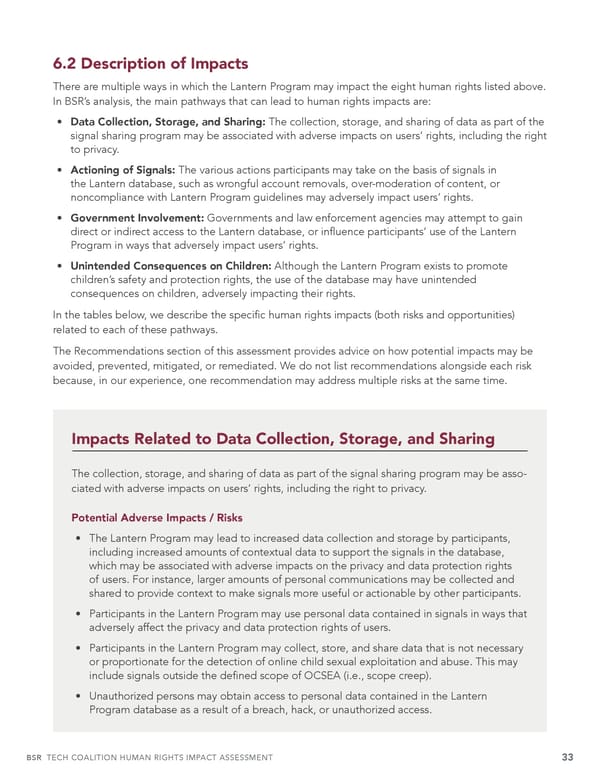6.2 Description of Impacts There are multiple ways in which the Lantern Program may impact the eight human rights listed above. In BSR’s analysis, the main pathways that can lead to human rights impacts are: • Data Collection, Storage, and Sharing: The collection, storage, and sharing of data as part of the signal sharing program may be associated with adverse impacts on users’ rights, including the right to privacy. • Actioning of Signals: The various actions participants may take on the basis of signals in the Lantern database, such as wrongful account removals, over-moderation of content, or noncompliance with Lantern Program guidelines may adversely impact users’ rights. • Government Involvement: Governments and law enforcement agencies may attempt to gain direct or indirect access to the Lantern database, or in昀氀uence participants’ use of the Lantern Program in ways that adversely impact users’ rights. • Unintended Consequences on Children: Although the Lantern Program exists to promote children’s safety and protection rights, the use of the database may have unintended consequences on children, adversely impacting their rights. In the tables below, we describe the speci昀椀c human rights impacts (both risks and opportunities) related to each of these pathways. The Recommendations section of this assessment provides advice on how potential impacts may be avoided, prevented, mitigated, or remediated. We do not list recommendations alongside each risk because, in our experience, one recommendation may address multiple risks at the same time. Impacts Related to Data Collection, Storage, and Sharing The collection, storage, and sharing of data as part of the signal sharing program may be asso- ciated with adverse impacts on users’ rights, including the right to privacy. Potential Adverse Impacts / Risks • The Lantern Program may lead to increased data collection and storage by participants, including increased amounts of contextual data to support the signals in the database, which may be associated with adverse impacts on the privacy and data protection rights of users. For instance, larger amounts of personal communications may be collected and shared to provide context to make signals more useful or actionable by other participants. • Participants in the Lantern Program may use personal data contained in signals in ways that adversely affect the privacy and data protection rights of users. • Participants in the Lantern Program may collect, store, and share data that is not necessary or proportionate for the detection of online child sexual exploitation and abuse. This may include signals outside the de昀椀ned scope of OCSEA (i.e., scope creep). • Unauthorized persons may obtain access to personal data contained in the Lantern Program database as a result of a breach, hack, or unauthorized access. BSR TECH COALITION HUMAN RIGHTS IMPACT ASSESSMENT 33
 Tech Coalition Human Rights Impact Assessment of the Lantern Program Page 32 Page 34
Tech Coalition Human Rights Impact Assessment of the Lantern Program Page 32 Page 34